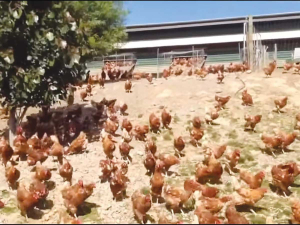NZVA urges animal owners to help fight antibiotic resistance through preventative care
Animal owners can help protect life-saving antibiotics from resistant bacteria by keeping their animals healthy, says the New Zealand Veterinary Association.
 PIANZ was honoured with the Antimicrobial Resistance (AMR) Award for reducing the use of the antibiotic zinc bacitracin (ZB).
PIANZ was honoured with the Antimicrobial Resistance (AMR) Award for reducing the use of the antibiotic zinc bacitracin (ZB).
The Poultry Industry Association of New Zealand (PIANZ) has won the New Zealand Veterinary Association (NZVA) Antimicrobial Resistance (AMR) Award.
It is the first time the award has been won by an industry body.
Presented earlier this month at the annual NZVA Awards, PIANZ was honoured for reducing the use of the antibiotic zinc bacitracin (ZB).
Previously, New Zealand chickens raised for meat were fed ZB along with their daily feed, as a preventative measure against disease. By introducing gut health support, and improving stock management techniques, the industry has successfully phased out ZB as a preventative measure, which had been a major contributor to New Zealand’s overall antimicrobial use.
PIANZ says the New Zealand poultry industry is now one of the few in the world that uses no antibiotics prophylactically at all.
NZVA chief executive Kevin Bryant congratulated PIANZ for its commitment to addressing the challenges of AMR.
“This award is greatly deserved,” he says.
“PIANZ has demonstrated leadership and become a great advocate for reducing our reliance on antibiotic use. It is a wonderful example of an industry coming together to find solutions for a problem that not only threatens animal health, but human health as well.”
AMR happens when viruses, bacteria, or parasites change and no longer respond to medicine, making them difficult or impossible to treat. Vaccinations are a critical tool in preventing the development and spread of drug-resistant viruses and bacteria. The World Health Organization (WHO) has said antimicrobial resistance is one of the top global public health and development threats.
PIANZ executive director Michael Brooks says he was proud the industry had achieved its collective goal of prophylactically eliminating the use of ZB, which had been used to prevent a commonly occurring disease in the chicken’s gut.
“The New Zealand poultry industry has worked together to achieve the significant milestone of using no antibiotics at all prophylactically,” he said. “Our commitment has been to help reduce AMR overall, and we are proud of the impact we have been able to make in this space.”
The industry’s work directly supports the NZVA’s goal that by 2030 New Zealand will not need antibiotics for the maintenance of animal health and wellness. To achieve this, it advocates that animal owners and farmers work alongside their veterinarians to ensure best practice care and nutrition is provided, and that animal vaccinations are kept up-to-date.
Budou are being picked now in Bridge Pā, the most intense and exciting time of the year for the Greencollar team – and the harvest of the finest eating grapes is weeks earlier than expected.
The Real Estate Institute of New Zealand (REINZ) has released its latest rural property report, providing a detailed view of New Zealand’s rural real estate market for the 12 months ending December 2025.
Rural retailer Farmlands has released it's latest round of half-year results, labeling it as evidence that its five-year strategy is delivering on financial performance and better value for members.
OPINION: "We are back to where we were a year ago," according to a leading banking analyst in the UK, referring to US president Donald Trump's latest imposition of a global 10% tariff on all exports into the US.
DairyNZ says the Government’s proposed Resource Management Act reform needs further work to ensure it delivers on its intent.
Overseas Trade Minister Todd McClay says he's working constructively with the Labour Party in the hope they will endorse the free trade agreement (FTA) with India when the agreement comes before Parliament for ratification.

OPINION: A mate of yours truly reckons rural Manawatu families are the latest to suffer under what he calls the…
OPINION: If old Winston Peters thinks building trade relations with new nations, such as India, isn't a necessary investment in…